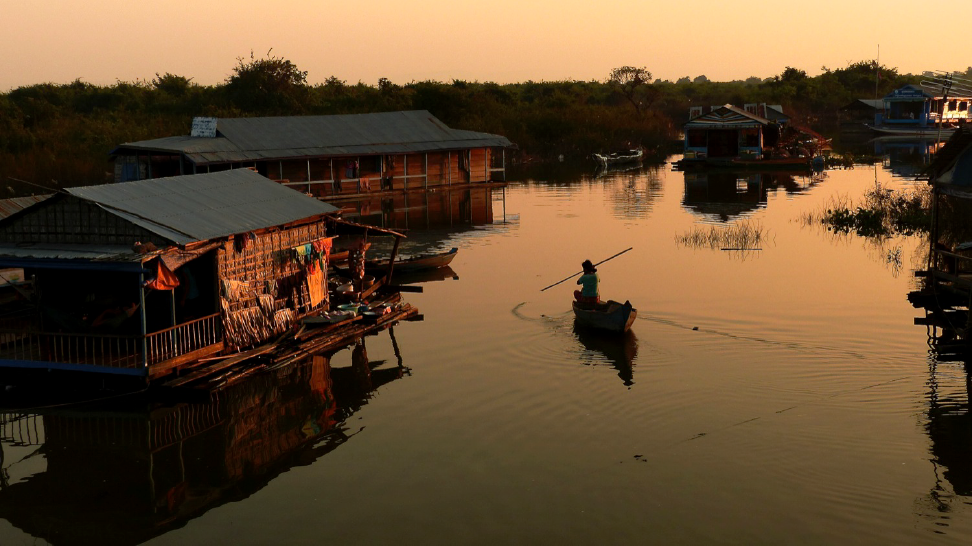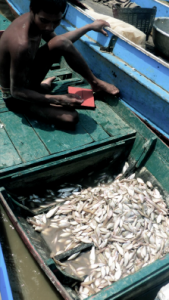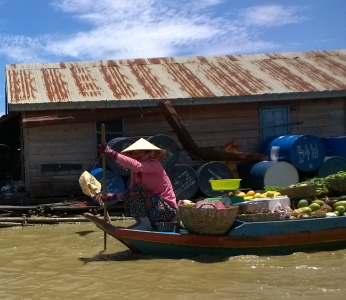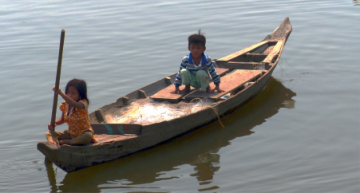Tonle Sap, the largest freshwater lake in Cambodia’s Mekong basin, is an integral fisheries resource for Cambodians’ livelihoods, food security and trade. UBC IOF scientists Dr. Louise Teh and Dr. Rashid Sumaila, in collaboration with researchers at the University of Guelph, Université Paul Sabatier and University of Battambang, investigated the economic impacts of global change on households around Tonle Sap, many of which engage in fishing. They explored current and future vulnerabilities of Tonle Sap inhabitants by examining their livelihood activities – their jobs or income sources – and responses to different scenarios of future change.

Photo: Evan Fraser.
“We found that many inhabitants are highly vulnerable to future change, as our results indicated that the majority of respondents face economic losses across all scenarios of future change,” said lead author Teh. “This emphasizes the need to sustain lake fisheries, which is crucial for supporting current and future livelihoods, and also for improving the adaptive ability of households.”
Inhabitants were grouped based on their livelihood: fishing only, fishing with other work like farming, and non-fishing work. While households near the lake usually fish with some income from other work, many of the poorest households depend on one livelihood, typically fishing.

Photo: Evan Fraser.
Respondents were then presented with 4 future scenarios: less fish in the Tonle Sap Lake, more farm land, urbanisation and no future change. For each, they were asked if they would continue with their current livelihood, and if not, how they would spend their time on other livelihoods. Based on this, the researchers estimated each group’s future net income under each scenario. They also investigated how livelihood diversification – having multiple livelihoods – and respondents’ closeness to the nearby National Road might affect this.
The researchers found a trade-off between having one livelihood and obtaining higher income, or having lower income with multiple livelihoods and diversifying the risk associated with each. Currently, non-fishers appeared the most vulnerable because they had the lowest net income. By contrast, fishing only respondents had the highest net income, which suggests specialising in fishing may be economically advantageous. However, relying on one livelihood comes with greater risks: livelihood security may fluctuate due to the seasonal nature of fishing, and fishing only respondents are most vulnerable to future changes on Tonle Sap fisheries.
“One way to mitigate economic losses is to engage in more than one livelihood activity, since our results indicate that those with multiple livelihoods experience about half the economic losses under future scenarios compared to those with single livelihoods,” Teh explained.
“One way to mitigate economic losses is to engage in more than one livelihood activity, since our results indicate that those with multiple livelihoods experience about half the economic losses under future scenarios compared to those with single livelihoods,” Teh explained.

Photo: Ratha Seng.
Surprisingly, inhabitants closest to the lake, who were expected to be the most vulnerable because they mostly only fished, currently had higher income than some inhabitants closer to the road, who had multiple livelihoods and were thus expected to be less vulnerable. This might also be explained by an income-diversification trade-off, where those closer to the lake have higher income but fewer livelihood options, while those further from the lake have more livelihood options but lower income from diversified activities.
For all scenarios of future change, all inhabitants were expected to lose net income across their livelihood activities, with the most vulnerable being those engaged in one livelihood activity. This is because single livelihood inhabitants are estimated to experience the largest losses while having the least ability to adapt to changes. The scenario depicting increased future urbanisation was expected to result in the largest net income loss for all groups, with the fishing only group most heavily affected.

Photo: Evan Fraser.
Most chose to retain their current livelihood for all scenarios, suggesting they may not have the technical or financial ability to adapt to changing conditions. However, under the urbanisation scenario, many fishing only respondents chose to engage in livelihood activities that generated less income than fishing. This suggests that they may not fully understand potential costs of switching livelihoods, and points to the need for livelihood programmes to educate inhabitants about the costs and benefits of new livelihood options.
The scientists published their findings in an article titled, “The economic impact of global change on fishing and non-fishing households in the Tonle Sap ecosystem, Pursat, Cambodia”, in the journal Fisheries Research.
Tags: Cambodia, faculty, FERU, fishing practices, freshwater, Indigenous fisheries, IOF Research Associates, Louise Teh, Rashid Sumaila, Research, small-scale fisheries